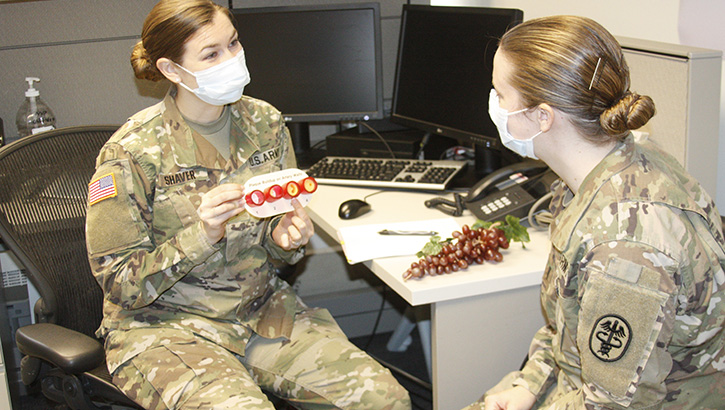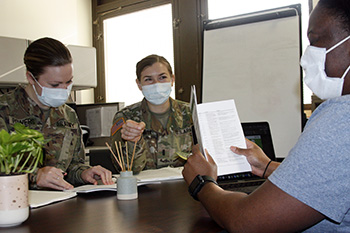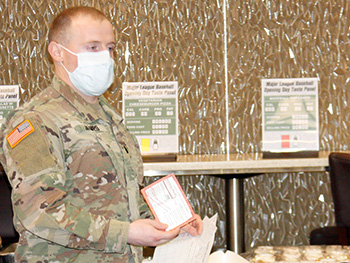Dietetic interns train to better MHS beneficiaries nutrition, health
 Army 1st Lt. Caitlyn Shaver and Army 1st Lt. Brittany Powers, dietetic interns at Walter Reed National Military Medical Center, role play a nutrition consultation as part of their training in Phase 2 of the U.S. Military-Baylor Graduate Program in Nutrition at WRNMMC (Photo by: Bernard Little, Walter Reed National Military Medical Center).
Army 1st Lt. Caitlyn Shaver and Army 1st Lt. Brittany Powers, dietetic interns at Walter Reed National Military Medical Center, role play a nutrition consultation as part of their training in Phase 2 of the U.S. Military-Baylor Graduate Program in Nutrition at WRNMMC (Photo by: Bernard Little, Walter Reed National Military Medical Center).
Registered dietitians, exercise therapists and other team members in the Nutrition Services Department (NSD) at Walter Reed National Military Medical Center, assist patients and staff in making informed food choices and developing healthy eating and physical activity habits. Dietetic interns at WRNMMC also help Military Health System beneficiaries develop healthy eating and lifestyle habits.
The interns come to WRNMMC as part of the two-phase U.S. Military-Baylor Graduate Program in Nutrition (GPN). WRNMMC is one of the host sites for Phase 2 of the program, when interns continue their education and training with a goal of earning a master's degree in nutrition from Baylor University, as well as a Dietetic Internship Verification Statement, making them eligible to sit for the National Registration Examination for Dietitians.
Before entering the nutrition internship program, candidates must have completed a bachelor's degree in nutrition and/or dietetics and have a verification statement from the Accreditation Council for Education in Nutrition and Dietetics (ACEND), which accredits the internship.
"WRNMMC is one of four hospital-based Phase 2 sites," stated Shawntel Green, a registered and licensed dietitian nutritionist who serves as site coordinator for the U.S. Military Dietetic Internship Program at Walter Reed Bethesda. She explained the first phase of the program, the didactic portion, lasts approximately nine months at the Graduate School on Joint Base San Antonio-Fort Sam Houston, Texas. Phase 2, the internship and research portion, lasts a year.
In addition to WRNMMC, other locations for Phase 2 of the program are Brooke Army Medical Center at Joint Base San Antonio-Fort Sam Houston in San Antonio, Texas; Madigan Army Medical Center at Joint Base Lewis-McChord in Tacoma, Washington; and Womack Army Medical Center at Fort Bragg, North Carolina.
"Currently, there are about 15 interns per class, however, with our increased mission of H2F [Holistic Health and Fitness], the goal will be to grow to approximately 30 interns," Green explained. "Typically, this equates to around five [to seven] interns per site," she added.
 Shawntel Green (right), a registered and licensed dietitian nutritionist who serves as site coordinator for the U.S. Military Dietetic Internship Program at Walter Reed Bethesda, provides instruction to dietetic interns Army 1st Lt. Caitlyn Shaver and Army 1st Lt. Brittany Powers (Photo by: Bernard Little, Walter Reed National Military Medical Center).
Shawntel Green (right), a registered and licensed dietitian nutritionist who serves as site coordinator for the U.S. Military Dietetic Internship Program at Walter Reed Bethesda, provides instruction to dietetic interns Army 1st Lt. Caitlyn Shaver and Army 1st Lt. Brittany Powers (Photo by: Bernard Little, Walter Reed National Military Medical Center).
Holistic Health and Fitness, or H2F, published into Army Field Manual 7-22 Oct. 1, 2020, covers the force's doctrine on physical readiness training. "[H2F] is the framework to encompass all aspects of human performance to include physical, sleep, nutritional, spiritual, and mental fitness," explained Army Maj. Gen. Lonnie Hibbard, commander of the U.S. Army Center for Initial Military Training. This "optimizes Soldier's readiness, reduces injury rates, improves rehabilitation after injury, and increases the overall effectiveness of the total Army," he added.
"While at WRNMMC for the GPN, the interns complete research and supervised practice in accordance with ACEND requirements. Our interns are required to meet more than 1,300 hours in research, performance nutrition, community nutrition, medical nutrition therapy and food service," Green explained.
"Upon graduation, they sit for the registered dietitian exam. Once they pass, they are registered dietitians. Typically, they would then go to one of our medical centers or community hospitals. However, they can also be assigned to brigades now as H2F dietitians," Green furthered.
According to Baylor University officials, the first-time pass rate for interns who complete the GPN and take the National Registration Examination for Dietitians, exceeds the national average.
Proper nourishment key in sustaining the optimal physical, mental, and emotional stamina needed to carry out demanding military roles, as well as for patients recovering from injury and illness, according Army Maj. Joetta Khan, chief of education and research GPN at WRNMMC. Dietetic interns at WRNMMC contribute to these efforts by assisting in the planning meals, menus and diets for staff and patients at the medical center. In addition, the interns also research and write papers regarding nutrition during their internships at WRNMMC.
 Army 1st Lt. Tanner James, a dietetic intern at Walter Reed National Military Medical Center, discusses potential dishes that may be available in the dining facility at WRNMMC (Photo by: Bernard Little, Walter Reed National Military Medical Center).
Army 1st Lt. Tanner James, a dietetic intern at Walter Reed National Military Medical Center, discusses potential dishes that may be available in the dining facility at WRNMMC (Photo by: Bernard Little, Walter Reed National Military Medical Center).
"This program has a heavy emphasis on research and leadership rotations along with clinical," stated Army 1st Lt. Brittany Powers, an intern in the GPN program at WRNMMC. "This is different from other internships and graduate programs, which have heavy emphasis on either clinical or food service only."
Army 1st Lt. Tanner James, also a dietetic intern in the GPN at WRNMMC, agreed.
"I wanted to be part of this program because I knew it would challenge me more than a traditional internship. Here, I am challenged mentally, physically, and as an Army officer. Also, I have always felt a duty to serve and be a part of something bigger than myself, so this program was an avenue to serve in the Army and further my education," he said.
The diverse opportunities and challenges available to the interns through the GPN's clinical and food service components, is what also attracted dietetic intern Army 1st Lt Caitlyn Shaver to the program. "[It] has a vigorous pace with high academic standards. It requires long hours and forces students to practice not just their academic skills, but their leadership, military and interpersonal skills as well."
"I like working with the veteran population, and I've met people from all walks of life and got to interact with people from different medical disciplines," stated Army 1st Lt. Emily Lauer, another dietetic intern at WRNMMC.
"We are held to a high standard in this program and have a lot to learn, so we quickly learn time management and put in long days to meet the requirements," James added.
"Each week you have to actively work on leadership projects, research manuscripts, outside rotation projects, rotation assignments and projects, journals and logs for the research and the current rotation, as well as research diseases and conditions you encounter during your rotation, and anything involved with preparing for a patient and writing patient notes," Powers explained about the program. She added the interns also have to meet their military fitness requirements of running and strength training at least five or six days each week.
"I wanted to continue to grow as a professional, and this program has allowed me to get a master's degree and develop as a leader," Shaver concluded.
"Throughout history, people have bartered, decided the fates of nations, and built friendships all over meals," Khan explained. "The sharing of meals has been shown to improve feelings of closeness, increase satisfaction with life, enhance team performance, and influence food choices," she added.
If you need help with your diet and/or exercise program, contact you registered dietitian or exercise therapist at your local military medical treatment facility.